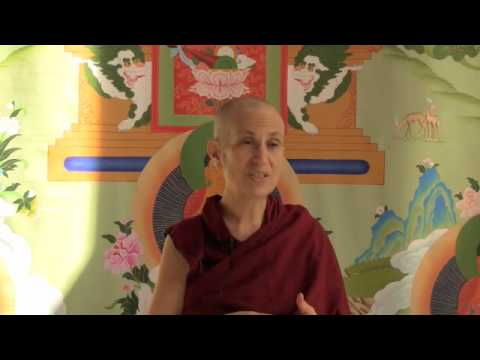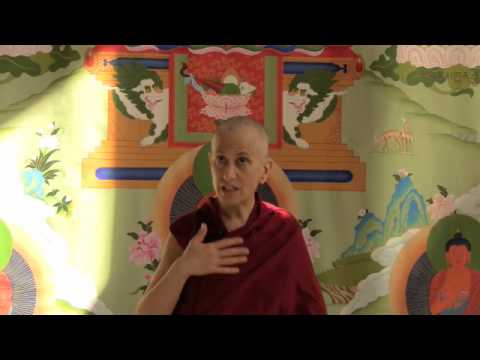Six root afflictions: Doubt
Stages of the Path #101: The Second Noble Truth
Part of a series of Bodhisattva's Breakfast Corner talks on the Stages of the Path (or Lamrim) as described in the Guru Puja text by Panchen Lama I Lobsang Chokyi Gyaltsen.
We’ve been talking about the six root afflictions: attachment, anger, ignorance, and now, doubt.
Doubt is a mind that is two-pointed about an important topic. It’s not just doubt that thinks, “Did I leave my keys here or did I leave them there?” Rather, it’s the kind of doubt that thinks, “Do my actions have an ethical dimension or don’t they? Do things inherently exist or don’t they? Are people inherently egotistical or is enlightenment possible?” So, it is specifically doubt about these important topics.
The reason why doubt is listed as an affliction is because it impedes you from getting anywhere. They really compare it to trying to sew with a two-pointed needle. You can’t go anywhere, can you? You keep sticking your needle in, and you just wind up frustrated. It’s the same thing with doubt, isn’t it? We go around and around.
They often talk of three kinds of doubt: the doubt that’s inclined towards the wrong conclusion, the doubt that’s “middle,” and then the doubt inclined towards the right conclusion. The doubt that’s inclined towards the wrong conclusion is the one where we really get stuck, because we’re really one step away from the wrong view.
Doubt can be very difficult to recognize because when it comes into the mind, it doesn’t say, “Hello, I’m doubt. I’m here to disturb you.” It says, “I don’t think this is right. I don’t think this exists. How can this be so? Prove it to me.” Doubt sneaks in there and makes a seemingly good case. Then we get caught up in it because we don’t identify it as an affliction. When anger comes into your mind, it’s like, “I’m right! I’m right!” But in your gut you’re really unhappy, so at some point you can say, “This is an affliction.” But with doubt we can go on with it for a really, really long time and not even recognize it as a hindrance in our practice.
Doubt verses curiosity
There’s a big difference between this kind of “circling doubt” and curiosity. Clearly, when we meet the Dharma we don’t understand everything. We’re curious; we want to know. We want information, but not everything makes sense. In fact, I think all the way until enlightenment, not everything makes sense. [laughter] There is going to be this kind of curiosity about things and wanting to know more—wanting information and clarity.
That kind of mind invigorates us. When we have that kind of mind, we want to study, to go to teachings, to discuss the Dharma with other people—we’re really thinking about things, and considering “this way” or “that way.” We’re not at all in a bad mood because of that.
Whereas this negative kind of doubt really puts us in a very kind of sour state. It’s almost bordering on being cynical or being skeptical, and it’s kind of a rebellious mind. “I don’t think rebirth exists. It’s your job to prove it to me. You prove it to me.” We get really kind of skeptical like that. We don’t really want an answer; we just want to provoke people.
Have you ever met people like that? [laughter] Yes? They say, “Why this?” Or, “Explain that.” But they don’t want an answer. They just want to provoke. That is the way our mind becomes, and we say that to ourselves in that way. Or we get really cynical: “This isn’t going to work; it’s all a bunch of hogwash. It’s all made up; nobody ever attained enlightenment.” This is a heavy kind of mind.
That kind of doubt is clearly something that’s going to be a big impediment in our practice. So, we have to learn to recognize it and to do something about it. You can see how it’s completely different from a mind that’s curious, which is kind of upbeat, and feels like, “I don’t get this! How can Bhāvaviveka say this and Buddhapālita say that and Chandrakirti say this? I don’t know what they’re trying to say.” You’re interested and you want to learn and find out. That’s really good. That kind of curiosity is great for our practice. But the doubt is kind of sour, you know? We’ve got to practice recognizing it, so I’ll talk a little more tomorrow. Yes? Well, maybe today. [laughter]
Audience: It seems like doubt tending toward the right conclusion is a virtuous mind?
Venerable Thubten Chodron (VTC): Doubt tending toward the right conclusion is not quite a virtuous mind, but it’s certainly better than doubt towards the wrong conclusion or doubt that’s wavering between the two. Because doubt that’s inclined towards the right conclusion is nearer to having a correct assumption, which is good.
Venerable Thubten Chodron
Venerable Chodron emphasizes the practical application of Buddha’s teachings in our daily lives and is especially skilled at explaining them in ways easily understood and practiced by Westerners. She is well known for her warm, humorous, and lucid teachings. She was ordained as a Buddhist nun in 1977 by Kyabje Ling Rinpoche in Dharamsala, India, and in 1986 she received bhikshuni (full) ordination in Taiwan. Read her full bio.


